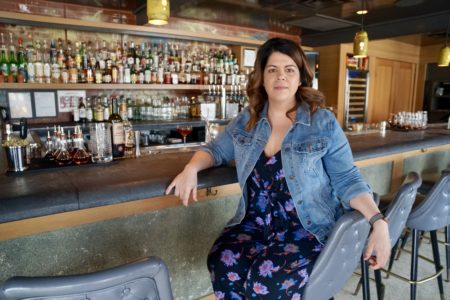Jessica Sanders’ Drink.Well. is the bar the community never knew it needed.
By Elizabeth Ucles, Photos by Courtney Runn
 From iconic New York City cocktail bars to other women in the industry, Drink.Well.’s Jessica Sanders finds inspiration everywhere she looks.
From iconic New York City cocktail bars to other women in the industry, Drink.Well.’s Jessica Sanders finds inspiration everywhere she looks.
Sanders grew up in sunny San Diego, later moving to New York to begin her career in the publishing industry. But in 2010, Sanders made her way down South to Austin with new career aspirations in mind. She dreamed of opening her own bar or restaurant. Sanders purchased the property Drink.Well. stands on in 2011.
While it was her time in New York that inspired her to start Drink.Well., Sanders explains the bars she would frequent were a bit intimidating for guests. She wanted to create a space with the same quality of cocktails but a more inviting vibe.
“You’d go in and you’d look at this menu. You wouldn’t understand what any of the ingredients were,” Sanders recalls. “You were sort of shunned if you ordered a vodka drink. That part of it didn’t seem quite as approachable as, say, your neighborhood pub where the same bartender’s been working there for 25 years, and it’s a very Coors Light, shot-and-a-beer type of environment.”
As Austin became a culinary destination, Sanders knew Drink.Well. needed to change the narrative. She recognized the absence of a high-quality cocktail bar, especially one outside downtown, and thus, she worked to cultivate a space with elevated cocktails without the pressure felt in New York cocktail bars.
 “What we really tried to do with Drink.Well. was bring great cocktails into a neighborhood space where you could wear your T-shirt and jeans and feel just as comfortable, and also get that cocktail at a reasonable price point,” she says.
“What we really tried to do with Drink.Well. was bring great cocktails into a neighborhood space where you could wear your T-shirt and jeans and feel just as comfortable, and also get that cocktail at a reasonable price point,” she says.
Generally speaking, the restaurant-and-bar industry is male-dominated, thus, Sanders looks to other successful women in the industry for inspiration. Female-run cocktail programs like Alba Huerta’s in Houston and Ivy Mix’s in New York City help Sanders see how she wants to grow as an operator.
“I call them my army of secret mentors,” Sanders says. “They don’t know they’re mentoring me, but I know [they are].”
With seven years under her belt, Sanders says her journey with Drink.Well. has helped her see management in a new light. She references a piece of advice she recently received from a colleague.
“You have to be OK with it being 80 percent right 80 percent of the time,” she says, noting that running a bar has become less about creating the perfect overall picture, and she’s now more focused on the details.
“You can’t have the attitude of don’t sweat the small stuff because it’s the small stuff that makes the big difference,” Sanders says. “In that sense, I have learned to sweat the small stuff and just let the big stuff figure itself out.”
Since Sanders arrived in Austin in 2010, the city’s restaurant-and-bar scene has changed dramatically, something that keeps her on her toes. Sanders keeps her menu modern by constantly offering new spirits and switching out the beer list. Sanders maintains the same hospitality ethos in customer experience and staff training.
 “Your guests are going to tell you what they want from you, and you’re going to have to deliver on that promise to them and they’ll keep coming back,” she says.
“Your guests are going to tell you what they want from you, and you’re going to have to deliver on that promise to them and they’ll keep coming back,” she says.
While the shift in the drink scene has created a new level of competition, Sanders’ experience in the industry has shown her she shouldn’t solely focus on making Drink.Well. the best of the best. Instead, it’s all about maintaining the interest in elevated drinks and farm-to-table cuisine.
Sanders says the success of many bars lies in how new or tenured and iconic they are. Oftentimes, the bars that are in that middle ground don’t succeed. However, with Drink.Well. at that six-year marker, Sanders says it’s taught her and her staff what success really means. While Sanders still looks to the success of other owners, she understands the success of her business ultimately lies in its uniqueness.
“The biggest difference, however, is years ago, it was ‘I want to be them,’ right?” Sanders says. “ ‘How can I make myself a copycat of what they’re doing?’ And now it’s ‘I want to be like them,’ being more rooted in my own personal identity as an operator and owner.”

